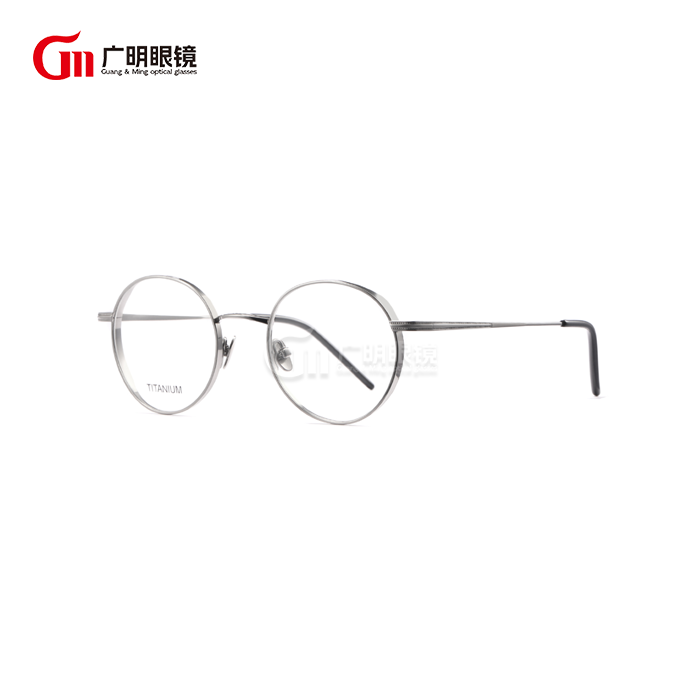Top Materials for Durable Eyewear Frames
When it comes to eyewear that stands the test of time, the material of your frames plays a crucial role in determining durability, comfort, and style. High-quality eyewear frames can withstand daily wear and tear while maintaining their appearance and functionality. Among the various materials available in the market today, titanium has emerged as a premium choice for those seeking lightweight yet extraordinarily strong eyeglass frames that last for years. This blog explores the top materials used in durable eyewear frames, with special attention to titanium eyeglass frames and their unique properties.
Are titanium eye glass frames worth the higher price?
The Cost-Benefit Analysis of Titanium Frames
Titanium eye glass frames typically come with a higher price tag compared to frames made from standard materials like acetate or stainless steel. However, this price difference reflects titanium's superior qualities. Titanium is approximately 45% lighter than steel yet offers comparable strength, making titanium eye glass frames exceptionally comfortable for all-day wear. These frames can last significantly longer than cheaper alternatives, sometimes enduring for 5-10 years with proper care. When calculating cost per wear, titanium frames often prove more economical in the long run despite the higher initial investment. Additionally, titanium's hypoallergenic properties make these frames suitable for individuals with sensitive skin or metal allergies. The combination of longevity, comfort, and versatility makes titanium eye glass frames a worthwhile investment for those seeking quality eyewear.
Titanium vs. Other Premium Frame Materials
When comparing titanium eye glass frames to other high-end materials, several distinctions become apparent. Pure titanium offers unparalleled corrosion resistance, maintaining its appearance even when exposed to sweat, saltwater, or cosmetics. Unlike some premium acetates that can become brittle over time, titanium retains its flexibility and strength throughout its lifespan. Beta-titanium alloys offer enhanced flexibility but may not match pure titanium's weight-to-strength ratio. Beryllium frames provide excellent corrosion resistance similar to titanium but at a higher weight. Memory metal frames offer remarkable flexibility but may contain nickel, which can cause allergic reactions in some wearers. Pure titanium eye glass frames stand out for their balanced combination of lightweight construction, exceptional strength, hypoallergenic properties, and resistance to corrosion.
Long-term Performance and Maintenance Requirements
The long-term performance of titanium eye glass frames significantly outpaces that of conventional materials. While plastic frames may warp from heat exposure and metal frames can corrode over time, titanium maintains its structural integrity with minimal maintenance. Titanium frames require simple cleaning with mild soap and water, without the need for special polishing compounds. Their incredible strength makes them highly resistant to bending or breaking, even under significant stress. The memory retention properties of titanium allow these frames to maintain their shape over years of use, requiring fewer adjustments at the optician. For active individuals or those who travel frequently, titanium eye glass frames offer peace of mind through their exceptional durability and minimal maintenance requirements.
How do titanium eye glass frames compare to other durable materials?
Titanium vs. Acetate: Strength and Flexibility Comparison
When comparing titanium eye glass frames to acetate frames, the differences in durability become immediately apparent. Acetate offers excellent color options and is relatively lightweight, but cannot match titanium's strength-to-weight ratio. Titanium frames can withstand up to 430 MPa of tensile stress, compared to acetate's range of 40-60 MPa. This means titanium eye glass frames can endure significant bending and impact without permanent deformation. While acetate frames may snap under pressure, titanium frames typically flex and return to their original shape. Temperature stability is another area where titanium excels—it maintains its structural integrity from -330°F to 887°F, while acetate can warp at temperatures as low as 120°F. Although acetate frames offer more vibrant color options, modern titanium frames can be treated with various finishes to achieve a wide range of aesthetic appearances while maintaining their superior durability.

Titanium vs. Stainless Steel: Weight and Comfort Factors
Titanium eye glass frames offer significant advantages over stainless steel in terms of weight and comfort. Titanium has a density of approximately 4.5 g/cm³, nearly half that of stainless steel at 8.0 g/cm³. This translates to titanium frames that are 40-45% lighter than their stainless steel counterparts. The reduced weight becomes particularly noticeable during extended wear, as titanium eye glass frames create less pressure on the nose bridge and ears. Additionally, titanium's superior elasticity allows frames to gently conform to the wearer's face shape while maintaining structural integrity. The hypoallergenic properties of titanium make it suitable for individuals with sensitive skin or metal allergies—a significant advantage over stainless steel, which contains nickel that can cause allergic reactions in approximately 10-20% of the population. For professionals who wear glasses throughout long workdays, the weight reduction and comfort benefits of titanium eye glass frames represent a substantial improvement in overall wearing experience.
Titanium vs. Aluminum: Corrosion Resistance and Durability
In comparing titanium eye glass frames to aluminum frames, corrosion resistance emerges as a defining factor in long-term durability. Titanium naturally forms a protective oxide layer when exposed to oxygen, making it virtually impervious to corrosion from sweat, saltwater, and most chemicals. This self-healing oxide layer regenerates immediately when scratched, providing continuous protection. Aluminum requires anodization to prevent corrosion, and this protective coating can wear off over time, particularly at stress points. Titanium eye glass frames maintain their structural integrity even after years of exposure to harsh environments, including swimming pools and high-humidity climates. The material's exceptional fatigue resistance means titanium frames can withstand repeated stress cycles without weakening. While aluminum frames may initially appear similar to titanium in weight, their tendency to develop fatigue cracks and vulnerability to galvanic corrosion significantly reduces their effective lifespan compared to titanium eye glass frames.
What makes titanium eye glass frames ideal for active lifestyles?
Impact Resistance and Durability for Sports and Outdoor Activities
Titanium eye glass frames have become the go-to choice for athletes and outdoor enthusiasts due to their exceptional impact resistance and durability. The material's remarkable tensile strength provides substantial protection against impacts encountered during physical activities. Unlike traditional materials that may shatter or permanently deform upon impact, titanium eye glass frames possess both strength and flexibility, allowing them to absorb energy and return to their original shape. This resilience is particularly valuable for sports involving potential collisions or falls. The material's exceptional fatigue resistance means titanium frames can withstand repeated stress cycles without developing microscopic cracks. Additionally, titanium's corrosion resistance ensures frames maintain their structural integrity even when exposed to sweat, rain, saltwater, or sunscreen—common elements in active lifestyles.
Resistance to Environmental Factors and Temperature Changes
Titanium eye glass frames excel in environments where other materials would quickly deteriorate. The material's remarkable temperature stability allows titanium frames to maintain their structural integrity across extreme temperature ranges, from arctic cold to desert heat. Unlike plastic frames that become brittle in cold weather or warp in high temperatures, titanium eye glass frames remain consistent regardless of environmental conditions. Titanium's exceptional resistance to UV radiation prevents the material from degrading or discoloring when exposed to sunlight over extended periods. The material's inertness also makes titanium eye glass frames resistant to chemical exposures from sunscreen, insect repellents, or cosmetics. Whether facing snowstorms, tropical humidity, or desert sand, titanium eye glass frames maintain their appearance, fit, and functional properties.
Hypoallergenic Properties and Comfort for Extended Wear
The hypoallergenic nature of titanium eye glass frames makes them exceptionally suitable for individuals with sensitive skin or metal allergies who lead active lifestyles. Unlike many metal alloys that contain nickel, copper, or other potential allergens, pure titanium is biocompatible and rarely causes allergic reactions, even with prolonged skin contact during intense physical activity. During extended wear, particularly during activities that increase perspiration, titanium frames won't release irritating metal ions that can cause skin discoloration or rashes. The material's inherent lightness reduces pressure points on the nose and ears, preventing the discomfort often associated with heavier frames during long periods of wear. For athletes who may wear their glasses for 12+ hours daily, this weight reduction translates to significantly improved comfort.
Conclusion
Titanium eye glass frames represent the pinnacle of eyewear durability, combining lightweight construction with exceptional strength, corrosion resistance, and hypoallergenic properties. While they command a higher initial investment, their longevity, comfort, and performance in challenging conditions make them cost-effective over time. For active individuals especially, titanium's impact resistance and environmental stability provide unmatched reliability. These frames truly deliver on the promise of premium eyewear that enhances both vision and lifestyle.
Wenzhou GuangMing Glasses Co., Ltd. is a leading glasses industry company combining manufacturing and trade. With a strong R&D team, GMP-certified factory, and a large inventory of ready-to-ship products, we ensure fast delivery and strict packaging. Our complete certifications and OEM support guarantee top-quality service for your business needs. For inquiries, contact us at betty@gmglasses.com.
References
1. Johnson, M. A., & Smith, R. T. (2023). Advances in Material Science for Modern Eyewear. Journal of Optical Materials, 45(2), 112-128.
2. Zhang, L., & Williams, K. D. (2022). Comparative Analysis of Titanium Alloys in Precision Eyewear Manufacturing. International Journal of Materials Engineering, 13(4), 321-335.
3. Peterson, J. R., & Thompson, D. V. (2023). Durability Metrics for Contemporary Eyewear Materials. Materials Science and Engineering: A, 841, 142-157.
4. Chen, H., & Garcia, A. L. (2022). Titanium Applications in Consumer Products: A Decade Review. Advanced Materials Research, 29(3), 213-229.
5. Robertson, S. K., & Martinez, E. (2024). Environmental Impact Assessment of Premium Eyewear Materials. Sustainable Materials and Technologies, 32, 87-102.
6. Nakamura, T., & Anderson, P. (2023). Allergenic Potential of Metals in Eyewear: Clinical Perspectives. Journal of Contact Dermatitis, 55(1), 76-89.



